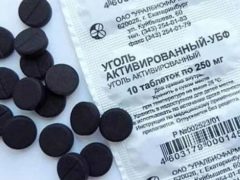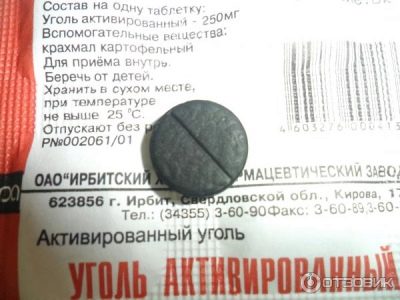Activated carbon in pregnancy: instructions for use
When nausea, diarrhea, bloating, discomfort in the intestine and other unpleasant symptoms of the digestive system occur, sorbents, such as activated charcoal, are often taken. It is quite popular during the period of childbearing, as it effectively and safely removes uncomfortable symptoms, cleansing the body of the future mother and not threatening the development of the fetus.
Features of the drug
The drug is produced by many pharmaceutical companies, so often next to its name you can see the abbreviation of the manufacturer, for example, UBF Activated Carbon is produced by Uralbiopharm. Most types of this drug are represented by tablets, the main component of which is called activated carbon.
Its dosage per tablet is often 250 mg, but some manufacturers produce the drug with a dose of 320 or 500 mg. Among the auxiliary components, you can often see potato starch, and some tablets also contain talc.
The medicine itself is round, black, with a rough surface. It sometimes has a dash for halving.
Tablets are usually sold in paper packs or blisters of 10 pieces, and one pack contains 10, 20, 30 or more tablets. This is a non-prescription drug, so buying an activated carbon in a pharmacy does not cause any difficulties.
The price of the drug depends on the manufacturer, but it is affordable, which is considered one of the main advantages of this drug. Keep it at home for 2-3 years from the date of manufacture should be in a dry place where the temperature will be no higher than 25 degrees Celsius. Otherwise, the drug deteriorates faster, and if the place is damp, it becomes unusable in a matter of days.
How does it work?
The main ingredient of tablets is a strong adsorbent, as due to the large surface activity is able to absorb a variety of substances. For its manufacture use wood, peat, coconut shell and other raw materials containing carbon. First, a high temperature without access of oxygen acts on it, and then it is activated, due to which the structure of the tablets becomes porous (coal is treated with steam or some compounds, while heating very strongly).
The result is a black porous substance with a significant absorption capacity. When it enters the cavity of the stomach and intestines, it adsorbs toxins, medications, metal salts, alkaloids and many other substances on its surface.. No less active drug absorbs a variety of gases. In addition, under the action of such tablets reduces the production of acid in the stomach, which helps with heartburn.
Activated carbon does not damage the gastrointestinal mucosa, is not metabolized in the digestive tract and is unable to be absorbed into the intestinal walls. Having absorbed gases, decomposition products and toxic compounds, he completely leaves the patient's body within 24 hours after ingestion, giving the stool a dark color (this is normal and should not be a cause for anxiety).
For the most effective action to take such pills should be immediately, as negative symptoms appeared.
Is it allowed during pregnancy?
Activated carbon refers to drugs that are allowed to use at any stage of pregnancy. He is appointed in the early stages, when the expectant mother only found out about her position, and in the last months of gestation.
Since the components of the pills cannot penetrate the bloodstream, they also do not get to the baby in the womb, which eliminates the harmful effects of the drug on the development of the fetus. This allows the use of such a sorbent, even without consulting a doctor. But if necessary, receive activated carbon nevertheless, the expectant mother should first consult a specialist in order to exclude the presence of contraindications and determine the correct dosage.
When is appointed?
Activated carbon is in demand in future mothers with unpleasant problems with digestion, for example, if a woman has a swelling, heartburn, diarrhea or vomiting. The tool helps out with early toxicosis, when the pregnant woman suffers from morning sickness and other ailments.
The drug is prescribed to eliminate the uncomfortable symptoms of rotavirus infection, salmonellosis, viral hepatitis, foodborne infection, and similar diseases. All of them represent a serious danger to the health of the pregnant woman and can affect the condition of the crumbs in the tummy, therefore the intake of the sorbent is fully justified.
The use of activated charcoal is resorted to in case of various poisonings, including overdose of drugs. If the future mother has an allergic reaction, such enterosorbent will contribute to a more rapid removal of allergens, so it can be taken with allergic dermatitis, urticaria and other types of allergies.
If the kidneys or liver of a pregnant woman do not cope with their functions, the doctor will recommend to drink activated charcoal to reduce the level of bilirubin or nitrogen in the blood.
In the later stages, this drug is usually associated with the pressure of the uterus on the intestines, which leads to diarrhea, flatulence and other unpleasant symptoms.
Possible harm
Although the drug is classified as safe, it can still cause complications if you ignore contraindications to receive. Such tablets should not be taken by women with ulcerative lesions of the intestine or stomach, especially if the damage to the mucous membrane is severe, and has become the cause of bleeding.
The drug is contraindicated in hypersensitivity, which can occur in individual patients. It also can not be drunk for pregnant women with intestinal atony.
But, even if the expectant mother has no contraindications for taking the pills, her body can react to this medicine with a liquefied stool, constipation, or other dyspeptic symptoms noted in the instructions for use. With a similar adverse reaction, you should consult a doctor and pick up another sorbent..
Another harmful effect of activated carbon can be called the fact that its active substance interferes with the absorption of both other drugs and useful elements from food. In addition, it will badly affect the state of microflora, which can lead to depression of immunity and symptoms of dysbiosis. For these reasons, long-term use of such pills is not recommended.
How to use?
The dose needed by the expectant mother is calculated by the weight of the woman. In most cases, activated carbon is taken at the rate of 250 mg for every 10 kilograms of body weight of a pregnant woman. But, if the expectant mother is poisoned with something, the dosage increases and must be chosen by the doctor.
Tablets are swallowed with clean water.
If there are problems with ingestion, the drug can be crumbled into powder, mixed with water and drunk. Taking the medication can not be combined with food - you need to wait 1-2 hours.
With regard to the duration of the reception, the activated carbon is often drunk only if you feel unwell. As soon as nausea, bloating and other symptoms disappear, admission stops.
When flatulence means prescribed course of 3-7 days. If you need to take the drug longer, then it is discharged a maximum of 2 weeks so that it does not interfere with the absorption of proteins, calcium, vitamins and other valuable substances.
Reviews
Those future mothers who had the opportunity to drink activated carbon while they were waiting for a child speak positively about this tool. They call it affordable and effective, so they often buy it for a home first-aid kit. Judging by the reviews, such pills quickly eliminate ailments for intestinal infections, flatulence, poisoning, heartburn, allergies and other problems.
Among the disadvantages are usually indicate a not too pleasant taste and the need to take a large amount of the drug at once.
What to replace?
Analogs of activated carbon are "Sorbeks" and "Carbopekt"which come in capsule form. They also operate due to activated carbon, are used for the same indications and are allowed at any gestational age.
Instead of such means, the expectant mother can use other sorbents, choosing the best option with the doctor. One of the most popular among them is Enterosgel. Such a gel-like substance has a porous structure and absorbs harmful bacteria, toxins and various toxic substances. It is not contraindicated in the waiting period of the baby and is required for poisoning, gastrointestinal infections and any intoxication.
Another effective sorbent allowed during pregnancy - "Polysorb MP". The colloidal silicon dioxide present in it rapidly binds toxic substances and other harmful compounds. The product is produced in powder form, which is diluted in water before use to form a suspension.
No less often for bloating, abdominal pain, food allergies or intestinal infections, expectant mothers are discharged "Smektu". This safe medicine of natural origin is presented in portion packets with a suspension or powder containing smectite. It is harmless to the baby in the womb and can be used both in the second or third trimester, and in the early stages.



















